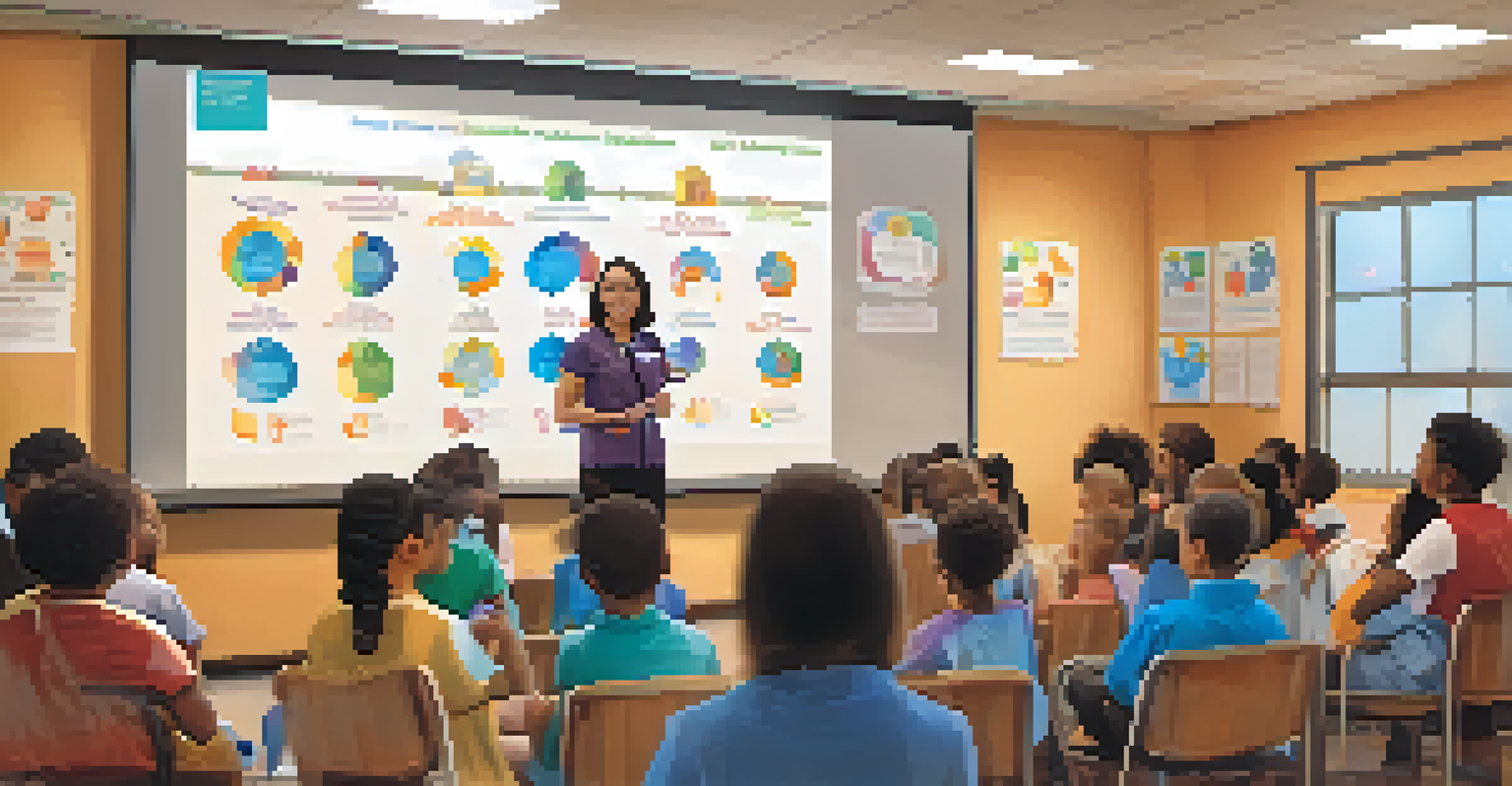The Importance of Vaccination Programs in Public Health

Understanding Vaccination and Its Purpose
Vaccination is a medical process that involves administering a vaccine to stimulate the body's immune response. This helps in building immunity against specific diseases without causing the illness itself. Essentially, it's like giving your immune system a practice run, preparing it to fight off infections more effectively in the future.
Vaccines are the tugboats of preventive health.
The primary purpose of vaccination is to prevent diseases that can lead to serious health complications or even death. For instance, vaccines have significantly reduced the incidence of diseases like measles and polio, which were once common and deadly. By preventing these diseases, we safeguard not just individual health but also public health as a whole.
Moreover, vaccination programs contribute to herd immunity, which occurs when a large portion of a community becomes immune to a disease. This makes it harder for the disease to spread, protecting those who cannot be vaccinated, such as infants or individuals with certain health conditions. In simple terms, when more people are vaccinated, everyone benefits.
The Historical Impact of Vaccination Programs
Vaccination programs have a rich history that showcases their profound impact on public health. For example, the global effort to eradicate smallpox culminated in 1980, thanks to widespread vaccination campaigns. This achievement not only saved countless lives but also demonstrated the power of coordinated public health initiatives.

Similarly, the introduction of the polio vaccine in the 1950s led to a dramatic decrease in cases, transforming the landscape of childhood illnesses. Before the vaccine, polio was a feared disease, causing paralysis and death. Today, polio is nearly eradicated in most parts of the world, highlighting how effective vaccination can be.
Vaccination Builds Community Immunity
Vaccination not only protects individuals but also contributes to herd immunity, safeguarding those who cannot be vaccinated.
These historical successes serve as reminders of the importance of maintaining and expanding vaccination programs. They encourage us to continue investing in research and public health policies that support vaccination, ensuring that future generations can also enjoy the benefits of immunization.
Vaccination Programs and Community Health
Vaccination programs play a crucial role in promoting community health. By reducing the prevalence of infectious diseases, they help alleviate the burden on healthcare systems. Fewer cases mean less strain on hospitals and resources, allowing healthcare professionals to focus on other essential areas.
The greatest benefit of vaccination is not just individual protection, but the protection of the community as a whole.
Moreover, community-wide vaccination efforts foster a sense of collective responsibility. When individuals choose to get vaccinated, they contribute to the health and safety of their neighbors and loved ones. This communal approach creates an environment where everyone can thrive and reduces the risk of outbreaks.
In essence, vaccination is more than just an individual choice; it's a communal investment in health. By participating in vaccination programs, communities can create a protective barrier against contagious diseases, ensuring a healthier future for all.
Challenges Facing Vaccination Programs Today
Despite their success, vaccination programs face several challenges in today's world. Misinformation about vaccines has become rampant, leading to hesitancy among some individuals and communities. This reluctance can hinder the progress made in achieving herd immunity and controlling diseases.
Additionally, access to vaccines remains a significant barrier in various regions, particularly in low-income countries. Factors such as cost, availability, and healthcare infrastructure can limit the reach of vaccination programs, leaving vulnerable populations at risk. Addressing these disparities is crucial for global health.
Historical Successes of Vaccination
Vaccination programs have eradicated diseases like smallpox and significantly reduced polio, showcasing their profound impact on public health.
Lastly, the emergence of new diseases and variants poses ongoing challenges for vaccination efforts. As seen with the COVID-19 pandemic, rapid vaccine development and distribution are essential to combatting new threats. Continuous investment in research and public health infrastructure is vital to stay ahead of these challenges.
The Role of Public Awareness in Vaccination
Public awareness plays a pivotal role in the success of vaccination programs. Educating communities about the benefits and safety of vaccines can help counteract misinformation. When people understand how vaccines work, they are more likely to participate in vaccination efforts.
Community leaders, healthcare professionals, and public health officials can champion vaccination by sharing accurate information and personal stories. For instance, testimonials from individuals who have benefited from vaccines can resonate and encourage others to get vaccinated. Relatable anecdotes can bridge the gap between scientific data and personal experience.
Furthermore, campaigns that highlight the importance of vaccinations during disease outbreaks can significantly boost participation rates. By emphasizing the immediate benefits of vaccination, such as protecting one's family and community, these initiatives can foster a culture of vaccination.
Future Directions for Vaccination Programs
Looking ahead, vaccination programs must evolve to meet new public health challenges. This includes not only developing new vaccines but also improving access to existing ones. Strategies such as mobile vaccination units and community outreach initiatives can help reach underserved populations.
Additionally, integrating technology into vaccination programs can enhance efficiency and tracking. Digital health records can streamline the vaccination process, ensuring individuals receive timely doses and reminders. This is particularly important in managing complex vaccination schedules for diseases like HPV or COVID-19.
Challenges Require Ongoing Efforts
Misinformation, access issues, and emerging diseases pose challenges to vaccination programs, necessitating continued public education and innovation.
Collaboration between governments, healthcare providers, and communities will be essential for the future of vaccination programs. By working together, we can create resilient public health systems that adapt to the changing landscape of infectious diseases.
Conclusion: The Ongoing Importance of Vaccination
In conclusion, vaccination programs are a cornerstone of public health that cannot be overlooked. They have historically saved millions of lives and continue to protect communities from preventable diseases. As we face new challenges, the importance of maintaining and improving these programs is more critical than ever.
Public health is a collective effort, and vaccination is a vital part of that equation. By participating in vaccination programs, individuals contribute to a healthier future for themselves and their communities. It’s a simple step that can lead to significant changes.

Ultimately, as we move forward, let’s prioritize education, accessibility, and collaboration in our vaccination efforts. Together, we can ensure that the benefits of vaccination continue to be felt for generations to come.